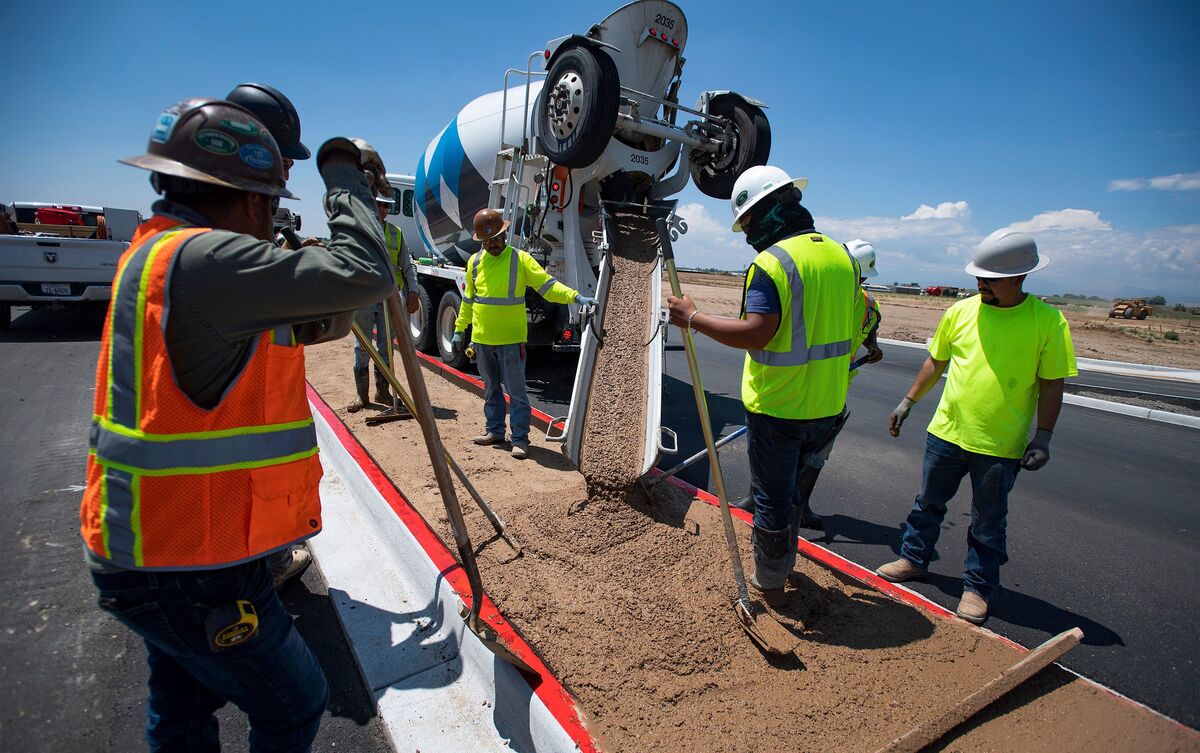Home>diy>Building & Construction>What Is The Average Salary For A Construction Worker


Building & Construction
What Is The Average Salary For A Construction Worker
Modified: October 20, 2024
Discover the average salary for a construction worker in the building construction industry. Gain insights into wage trends and salary ranges.
(Many of the links in this article redirect to a specific reviewed product. Your purchase of these products through affiliate links helps to generate commission for Storables.com, at no extra cost. Learn more)
Introduction
Construction workers play a vital role in building the infrastructure we rely on every day. From constructing buildings and bridges to paving roads and laying foundations, these skilled professionals are the backbone of the construction industry. If you’re considering a career in construction, one of your primary concerns is likely the average salary you can expect to earn. In this article, we will explore the factors that influence construction worker salaries and provide an overview of the average salaries for various job titles, geographic locations, experience levels, and education levels.
Before diving into the details, it’s essential to understand that construction worker salaries can vary significantly based on several factors. These factors include the job title, geographic location, experience level, and education level of the construction worker. Additionally, benefits and compensation packages can also impact the overall earnings of construction workers.
Despite these variations, the construction industry offers promising opportunities for competitive salaries and career growth. Construction workers can make a significant impact on their communities while enjoying stable employment and attractive compensation.
So, let’s explore the factors that influence construction worker salaries and delve into the average salaries in more detail. By understanding these aspects, aspiring construction workers can make informed decisions about their career paths and potential earning potentials.
Key Takeaways:
- Construction workers’ salaries vary based on job title, location, experience, and education. Additional benefits and compensation packages contribute to the overall value of their earnings, offering stability and growth opportunities.
- The construction industry provides promising career prospects with steady employment and potential for advancement. By acquiring specialized skills and staying informed about industry trends, construction workers can build rewarding and fulfilling careers.
Read more: What Is The Average Salary For A CAD Drafter
Factors Affecting Construction Worker Salaries
Several factors can influence the salaries of construction workers. Understanding these factors can help you gauge the potential earning potential in the construction industry. Here are some of the key factors:
- Job Title: The specific job title within the construction industry can significantly impact a construction worker’s salary. Certain positions, such as project managers or construction supervisors, often come with higher salaries due to their increased responsibilities and expertise. On the other hand, entry-level positions like laborers or apprentices may have lower starting salaries.
- Geographic Location: The geographic location of construction work plays a role in determining salaries. Construction workers in urban areas or regions with high demand for construction tend to earn higher wages due to the increased cost of living and market conditions. On the other hand, rural areas or regions with less construction activity may have lower salary ranges.
- Experience Level: Another crucial factor is the level of experience a construction worker possesses. Generally, as workers gain more experience in the industry, their salaries tend to increase. This increase reflects the value of their expertise and the ability to handle more complex projects.
- Education Level: While construction work traditionally emphasizes hands-on skills and experience, having a higher education level can positively impact a construction worker’s salary. Pursuing certifications, associate’s degrees, or bachelor’s degrees in fields related to construction, such as construction management or civil engineering, can lead to higher-paying positions and opportunities for advancement.
It’s important to note that these factors are not mutually exclusive and often interact with one another. For example, a construction worker with a higher education level and extensive experience in a specialized field may command a higher salary even in a location with lower average wages. Conversely, a construction worker with limited experience who works in a high-demand urban area may earn a higher salary due to the competitive market.
By considering these factors, aspiring construction workers can gain insight into how different aspects of their career paths can impact their earning potential. It’s also worth noting that with dedication, continuous learning, and professional development, construction workers can advance their careers and increase their salaries over time.
Average Salary for Construction Workers by Job Title
The average salary for construction workers can vary based on their specific job titles within the industry. Different roles require different skill sets and levels of responsibility, which can impact earning potential. Here is an overview of average salaries for various job titles in the construction industry:
- Construction Laborer: A construction laborer typically performs manual tasks on construction sites, such as carrying materials, digging trenches, and assisting with general site cleanup. The average salary for construction laborers ranges from $30,000 to $40,000 per year.
- Carpenter: Carpenters are skilled tradespeople who construct and repair building frameworks and structures made of wood, steel, concrete, or other materials. This role requires proficiency in reading blueprints, measuring and cutting materials, and assembling them. On average, carpenters earn between $40,000 and $60,000 annually.
- Construction Supervisor: Construction supervisors oversee and coordinate construction projects, ensuring that they stay on schedule and within budget. They manage teams of workers, monitor progress, and handle any issues that arise on the job site. Construction supervisors can earn an average salary ranging from $60,000 to $80,000 per year.
- Project Manager: Project managers are responsible for overseeing the entire construction project from start to finish. They coordinate with clients, architects, subcontractors, and construction teams to ensure successful project completion. Due to the high level of responsibility, project managers earn an average salary of $70,000 to $100,000 per year.
- Construction Engineer: Construction engineers are professionals who apply engineering principles to the planning, design, and construction of infrastructure projects. They collaborate with architects, analyze structural requirements, and ensure that construction processes comply with industry standards. Construction engineers typically earn between $70,000 and $90,000 annually.
Please note that these salary ranges are approximate and can vary depending on factors such as location, experience, and company size. Additionally, individuals with specialized skills or certifications may command higher salaries within their respective job titles.
It’s essential to keep in mind that salaries in the construction industry can increase over time with experience and professional development. By continually improving their skills, staying informed about industry trends, and seeking out additional certifications, construction workers can enhance their earning potential and advance to higher-paying positions within their chosen field.
Average Salary for Construction Workers by Geographic Location
The geographic location of construction work plays a significant role in determining the average salaries for construction workers. Wages can vary widely based on the cost of living, demand for construction, and regional economic factors. Here is an overview of average salaries for construction workers in different geographic locations:
- Urban Areas: Construction workers in major urban areas, such as New York City, Los Angeles, or Chicago, generally earn higher salaries due to the higher cost of living and increased demand for construction projects. In these areas, construction laborers may earn an average salary of $40,000 to $50,000 per year, while skilled tradespeople like carpenters or electricians can earn between $50,000 and $70,000 annually.
- Rural Areas: In rural areas or regions with less construction activity, salaries for construction workers may be lower compared to urban areas. Construction laborers in rural areas can expect an average salary ranging from $25,000 to $35,000 per year. Skilled tradespeople may earn between $35,000 and $50,000 annually.
- High-Demand Locations: Certain regions with booming construction industries, such as states experiencing rapid population growth, may offer higher salaries. For example, construction workers in Texas or Florida, where construction activity is robust, may earn slightly higher salaries compared to other parts of the country. The average salaries for construction workers in high-demand locations can be around $40,000 to $60,000 per year.
- International Opportunities: Construction workers who are open to working internationally may have the chance to earn higher salaries in certain countries. For example, countries with extensive infrastructure development projects, such as the United Arab Emirates or Australia, often offer competitive wages for construction workers. However, it’s essential to consider factors like living costs, work visa requirements, and cultural considerations when exploring international opportunities.
Remember that these salary ranges are approximate and can vary based on factors such as experience, education level, and specific job titles. It’s also worth noting that cost-of-living considerations should be taken into account when evaluating salaries in different locations.
Construction workers who are willing to relocate or travel for work may have opportunities to earn higher salaries in areas with significant construction projects. However, keep in mind that local job markets and industry demands can fluctuate, so research and staying up-to-date with market trends are essential when considering geographic locations for construction employment.
Average Salary for Construction Workers by Experience Level
Experience plays a crucial role in the construction industry and can significantly impact a construction worker’s earning potential. As construction workers gain more experience and develop their skills, they often command higher salaries. Here is an overview of average salaries for construction workers based on their experience level:
- Entry-Level: Construction workers who are just starting their careers typically fall into the entry-level category. These workers may have limited industry experience and tend to perform general labor tasks on construction sites. On average, entry-level construction workers can expect to earn between $30,000 and $40,000 per year.
- Mid-Level: As construction workers gain a few years of experience and develop their skills, they move into the mid-level category. They may have specialized experience in a particular trade or have taken on increased responsibilities. Mid-level construction workers, such as carpenters or electricians, can earn an average salary ranging from $40,000 to $60,000 per year.
- Senior-Level: Construction workers with extensive experience and expertise in their field are considered senior-level. These individuals often hold supervisory or leadership roles, managing projects or teams. Senior-level construction workers, such as construction supervisors or project managers, can earn an average salary of $60,000 to $80,000 per year or higher, depending on their specific job titles and responsibilities.
It is important to note that these salary ranges are approximate and can vary based on factors such as the geographic location, company size, and industry demand. Additionally, construction workers who continuously seek out professional development opportunities and additional certifications may enhance their skillset and earning potential at a faster rate.
Construction workers can also boost their earning potential by specializing in high-demand areas or niche sectors within the industry. For example, construction workers with expertise in green building practices, sustainable construction, or advanced technologies may see increased demand and higher salaries due to the growing emphasis on environmentally friendly and innovative construction practices.
Regardless of experience level, it’s crucial for construction workers to stay updated on industry trends and advancements, as well as seek opportunities for continuous learning and skill development. By doing so, construction workers can enhance their expertise, improve their marketability, and potentially increase their earning potential within the industry.
The average salary for a construction worker can vary depending on location, experience, and specific trade. In the United States, the average hourly wage for construction laborers was $19.74 in 2020, according to the Bureau of Labor Statistics.
Average Salary for Construction Workers by Education Level
In the construction industry, while hands-on skills and experience are highly valued, the level of education can also have a significant impact on a construction worker’s earning potential. Higher education levels often provide opportunities for advancement, increased responsibilities, and higher salaries. Here is an overview of average salaries for construction workers based on their education level:
- High School Diploma or Equivalent: Many entry-level construction positions, such as construction laborers or helpers, do not require higher education beyond a high school diploma or equivalent. Construction workers with a high school diploma can earn an average salary ranging from $30,000 to $40,000 per year.
- Trade School and Certifications: Completing a trade school program or obtaining industry-recognized certifications can provide construction workers with specialized skills and knowledge in a particular trade, such as carpentry or plumbing. These additional qualifications can lead to higher-paying positions within the industry. On average, construction workers with trade school education and certifications can earn between $40,000 and $60,000 per year.
- Associate’s Degree: Pursuing an associate’s degree in a construction-related field, such as construction management or civil engineering, can open doors to higher-paying positions with increased responsibilities in the industry. Construction workers with an associate’s degree can earn an average salary ranging from $50,000 to $70,000 per year.
- Bachelor’s Degree or Higher: Construction workers who hold a bachelor’s degree or higher-level education in construction management, civil engineering, or architecture often qualify for advanced positions, such as project managers or construction engineers. These roles typically come with higher salaries due to the level of expertise and leadership required. On average, construction workers with a bachelor’s degree or higher can earn between $70,000 and $100,000 per year.
It’s important to note that these salary ranges are approximate and can vary based on factors such as experience, job title, geographic location, and market demand. Additionally, it’s worth considering that construction workers with higher education levels may have opportunities for career advancement, salary growth, and increased job security.
Continued professional development and staying up-to-date with industry advancements are also critical for construction workers at all education levels. By acquiring new skills, pursuing additional certifications, and staying informed about emerging construction technologies and practices, construction workers can enhance their expertise and increase their earning potential within the industry.
Benefits and Compensation Packages for Construction Workers
In addition to base salaries, construction workers often receive benefits and compensation packages that can add value to their overall compensation. While the specific benefits and packages can vary based on employers and job titles, here are some common components:
- Health Insurance: Many construction companies provide health insurance coverage for their employees. This can include medical, dental, and vision insurance plans. The extent of coverage and employee contributions may vary, but having access to health insurance can provide peace of mind and financial protection for construction workers and their families.
- Retirement Plans: Construction workers may have access to employer-sponsored retirement plans, such as 401(k) or pension plans. These plans allow for long-term savings and help construction workers prepare for their future financial needs. Employers may offer matching contributions to employee contributions, increasing the value of the retirement benefits.
- Paid Time Off: Paid time off, including vacation days, holidays, and sick leave, is a common benefit for construction workers. This allows workers to take time off for personal and family needs or to rest and rejuvenate. The specific number of days and policies vary by employer.
- Bonuses and Incentives: Construction companies may offer performance-based bonuses or incentives to reward employees for their hard work and dedication. These can include project completion bonuses, safety bonuses, or performance-based rewards tied to specific goals or metrics.
- Training and Professional Development: Some employers invest in the professional development of their construction workers by providing training programs, workshops, or educational opportunities. This not only enhances the skills and knowledge of the workers but also contributes to their long-term career growth and earning potential.
- Work-Life Balance: While not a traditional benefit, work-life balance initiatives are becoming increasingly important in the construction industry. Employers may offer flexible work schedules, remote work opportunities, or alternative work arrangements to support the well-being and work-life balance of construction workers.
The specific benefits and compensation packages offered by employers can vary. Construction workers should carefully review and compare the benefits packages when considering employment opportunities. It’s crucial to understand the details of the benefits, such as coverage levels, eligibility requirements, and any associated employee contributions.
Construction workers should also consider the overall value of the benefits and compensation package when evaluating job offers. While a higher base salary may be appealing, a comprehensive benefits package that includes health insurance, retirement plans, and paid time off can significantly enhance the overall compensation and quality of life for construction workers.
Job Outlook for Construction Workers
The job outlook for construction workers is promising, with opportunities for steady employment and potential career growth. Several factors contribute to this positive outlook for the construction industry:
- Industry Demand: The construction industry plays a vital role in building and maintaining infrastructure, including residential, commercial, and public projects. As population growth, urbanization, and infrastructure development continue, the demand for construction workers remains steady. New construction projects, renovations, and infrastructure upgrades provide a consistent stream of work opportunities for construction workers.
- Retirement and Replacement Needs: As experienced construction workers retire or transition to different careers, there is an ongoing need for new workers to fill these positions. This paves the way for younger individuals to enter the construction industry and pursue fulfilling careers. Additionally, technological advancements and evolving construction methods create a demand for workers with updated skills and knowledge, opening up opportunities for those with a willingness to learn and adapt.
- Specialized Skills: Construction projects in areas such as green building, sustainable construction, and energy-efficient design are on the rise. Workers with specialized skills in these areas, as well as expertise in advanced construction technologies and digital modeling, are in high demand. Developing specialized skills can enhance job prospects and potentially lead to higher salaries and career advancement.
- Infrastructure Investments: Government investments in infrastructure, such as roads, bridges, schools, hospitals, and public transportation systems, create a steady demand for construction workers. In many countries, government initiatives to stimulate economic growth and improve infrastructure contribute to a robust job market in the construction industry.
Despite the positive outlook, it’s essential to note that the construction industry can be cyclical and subject to economic fluctuations. Downturns in the economy or changes in government funding priorities can impact the number of construction projects and job availability. However, construction workers with diverse skills, flexibility, and a willingness to adapt to changing circumstances can navigate through these challenges and maintain a stable career.
To thrive in the construction industry, it’s crucial for workers to stay updated on industry trends, acquire new skills, and seek professional development opportunities. Continuing education, attending workshops or conferences, and pursuing relevant certifications can enhance job prospects and ensure long-term employability.
Overall, the job outlook for construction workers is positive, with steady employment opportunities and potential for growth. By staying informed, acquiring specialized skills, and continuously improving their craft, construction workers can build rewarding careers in a dynamic and essential industry.
Conclusion
The construction industry offers attractive career opportunities for individuals interested in building, creating, and shaping the world around us. As discussed in this article, several factors influence the average salaries of construction workers, including their job titles, geographic locations, experience levels, and education levels.
While salary ranges can vary based on these factors, it’s important to remember that compensation packages for construction workers often extend beyond base salaries. The industry commonly provides benefits such as health insurance, retirement plans, paid time off, and opportunities for professional development. These additional components contribute to the overall value of a construction worker’s compensation package.
The job outlook for construction workers is promising, with ongoing demand for skilled workers, replacement needs due to retirements, and advancements in construction technologies and practices. As a result, construction workers can enjoy stable employment opportunities and potential career growth.
To thrive in the construction industry, individuals should consider acquiring specialized skills, pursuing higher education in construction-related fields, and staying informed about emerging trends and technologies. Continuous professional development and adaptability are key to maintaining competitiveness in the job market and maximizing earning potential.
Whether you’re starting as an entry-level construction worker or have experience in the industry, the construction field offers a variety of pathways for personal and professional growth. By leveraging your skills, education, and experience, you can build a rewarding career while contributing to the development of infrastructure and the communities we live in.
In conclusion, construction workers play a vital role in constructing the physical spaces we inhabit. With a promising job outlook, competitive salaries, and opportunities for advancement, the construction industry presents a fulfilling and financially rewarding path for those passionate about building and construction.
Frequently Asked Questions about What Is The Average Salary For A Construction Worker
Was this page helpful?
At Storables.com, we guarantee accurate and reliable information. Our content, validated by Expert Board Contributors, is crafted following stringent Editorial Policies. We're committed to providing you with well-researched, expert-backed insights for all your informational needs.















0 thoughts on “What Is The Average Salary For A Construction Worker”